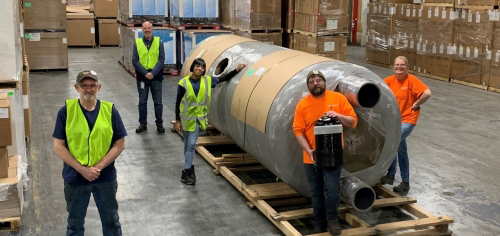A friend of mine worked for a major technology company for decades and frequently complained about the sales people there. Not only were they not as smart as the technical people like him, but they made more money – which wasn’t fair. After all, he and his colleagues provided the real value to the customer. All the sales people did was shake hands, play golf and spend T&E money.
So, he quit and started his own business. About 18 months later, having closed exactly one small contract, he went back to work for another large company. He has a new appreciation for sales people now, forged in the fire of prospecting, developing proposals, making pitches and dealing with rejection.
“Sales is really hard,” he told me sadly.
Grit and the Sales Goal
The problem with selling isn’t just that it’s hard. The problem is that great sales reps make it look so easy that lots of other people think they could sell, too. In reality, great sales people are forged with a rare alchemy of good organizational ability, communication skills, an innate understanding of psychology and that most-important, hard-to-detect but scarce-as-a-unicorn quality: grit.
How else can you explain someone excelling in a career with the constant pressure of a scoreboard that everyone in the company can see? A profession where a bad quarter or a bad year doesn’t result in a performance review – it results in losing your job?
Even on vacation, most great sales people spend a lot of their time in e-mail and on the phone. There’s no such thing as a “paid vacation” – if you don’t work for any reason, your income suffers.
Unfortunately, there’s no test for “grit” and, unlike IQ, there aren’t really any obvious traits, like a big vocabulary or wizard-like Excel skills. I bet all of us can think of sales people who didn’t seem very impressive when you met them but had an incredible ability to grow revenues and earn customer loyalty.
That’s because grit isn’t something you wear on your sleeve – it’s a basic wiring of your personality to be relentless in the face of adversity. To refuse to give up. To have an iron will to drive towards a goal even when the odds are stacked against you.
You probably employ reps like this. Some of them seemed pretty average at first; they needed to learn how to sell, how to deal with difficult situations, how to keep going when times were tough. Eventually, they learned that if they just kept working hard and never quit, they would succeed. They went from good to grit.
Good Grit vs. Grit in the Gears
Sales reps face a lot of adversity and sometimes their own employers are the source of it. This is mystifying and often unnecessary. Sure, there are bad sales people who are unreasonably demanding but there are no good sales people who are not demanding at all.
Great sales people will put a strain on your organization – they want perfect service on every single order. Notably, so do your customers. How you respond to this pressure from your sales force will, in my experience, define whether or not you grow to your potential.
If you’ve managed a P&L before, you know that everything in your budget depends on making the top-line numbers. Paradoxically, for many distributors, sales compensation is the biggest expense item in their P&L, but there is no specific plan to improve sales force effectiveness, ensure they’re spending as much time as possible on sales activities and are properly supported by the rest of the company.
You likely have lots of controls around your expenses – workflow, approvals, purchasing limits, POS processes, procurement cards audits, spend analytics, etc., but what kinds of controls do you have to ensure you make the top-line number that pays for everything? How do you know that your sales compensation dollars are actually driving sales? Do you have a playbook that matches today's fast-changing market conditions?
Have you:
- Studied how your sales reps are allocating their time so you know how much of it is really involved in “selling” vs. expediting, meeting, making deliveries, etc.?
- Ensured good communication between your sales reps and your inside team so that they all have current and complete information about each customer?
- Measured customer profitability so your sales reps are focused on the right accounts?
- Aligned the goals between sales and operations to take the grit out of the gears so your reps are selling and not squabbling with other employees?
- Assigned your inbound personnel into separate customer service vs. outbound calling groups so that you have the right skills focused on the right tasks?
- Designed and implemented an ongoing program to teach your sales people (inside and out) how to make a sales call? How to manage an account package? How to use time efficiently? How to deal with objections?
- Made sure your reps understand your products and services, know who to call when they need help and have access to senior executives when they need answers fast?
Speaking of Training, What About You?
If you answered “yes” to all of the questions, then please come and present at an MDM conference so you can teach other distribution executives how you’ve done it. If your organization’s sales effectiveness isn’t where it needs to be, then I invite you to attend MDM’s Sales GPS 2019, coming up on Feb. 20-22 in Las Vegas.
We have a top-notch group of distribution executives and industry experts who can tell you exactly how to get the most out of your investment in sales people. I invite you to click here to see the agenda, check out the speakers and register for your spot. We get rave reviews about our conferences because they are designed specifically for distribution leaders across all verticals. I hope you will join us so you can get some valuable insights that will help you make your sales goals in 2019.
See you in Las Vegas. Please leave a comment below or email me at ian@mdm.com.
Related Posts
-
Industrial & Flow Technologies sales were down 3% compared to sales for the same period…
-
The company reported an operating loss of $115.8 million.
-
Fourth quarter sales were up 2% year-over-year.




